
Subjects Inside: Article
V Applications
FAQ,
Application Counts By
Congress, Articles,
AVC Legislative Report, CRS Reports,
Convention of State, Compact for America, COS, CFA--Which States are Which?, The Historic Record of COS, COS, CFA Laws, COS Articles, CRS Reports on COS/CFA, COS, CFA Financial Records, CFA Financials, COS Financials, COS/CFA Financial Conclusions, John
Birch Society, Con-Con, Runaway
Convention, Who Called the Convention, Congressional
Vote on a "Runaway" Convention, "Obey
the Constitution, Only Two More States", Illegal Rescissions, The Phony Burger Letter, The
Madison Letter, Fotheringham Exchange, JBS Articles, Sibley
Lawsuit, General Interest, Article V.org,
Robert Natelson, History
of Article V, Counting the Applications, The Numeric Count History, Congressional Decision of May 5, 1789,
Development of Article V, The Committee of the Whole, The Committee of Detail, August 30, September 10, Committee of Style, September 15, Official Government Documents,
History of FOAVC, Founders,
Audio/Visual,
Links,
Contact
Us, Legal
Page, 14th Amendment, The Electoral Process, Packets,
Definitions,
Numeric, (
Applications grouped by numeric count as required by the Constitution),
Same Subject (Applications grouped by amendment subject, not required by the Constitution for a convention call).
Page 5 B--COS, CFA State Laws
The purpose of this page is to present the text of all applications and
state laws submitted by the states
dealing a "convention of
states" or "compact" to propose amendments. The page will also present
any non COS/CFA state laws untented to regulate an Article V
Convention. Publication of any
application however is subject to publication first appearing in the
Congressional Record as proof the application was actually transmitted
to Congress. Due to the complexities of
some state legislature's web sites, FOAVC has, in some instances,
been unable to locate the appropriate application or legislation. This
missing information is noted below. FOAVC would appreciate anyone who
can provide a link to the needed information contacting us at questions@foavc.org.
FOAVC believes in the principle of Res Ipsa Louquitur--let the facts
speak for themselves. FOAVC also believes people should have the
opportunity to make up their minds on an issue based on original
material rather than an interpretation by some individual or group. For
this reason FOAVC is presenting copies of the actual applications and
state laws thus far enacted in regards to COS/CFA. A brief description
of the state applications and state law from each state is next to the
state's outline. This said however FOAVC feels duty bound to point out some facts about these state laws:
- There
is nothing in any COS law which limits what "instructions" the small
group of legislators controlling the convention may give to the COS
convention once it is convened. While COS may present one political
agenda in order to ensure passage of these laws and associated
applications for a COS convention, once convened, an entirely different
set of "instructions" may be given to the delegates to create new
amendments not even mentioned by COS during its campaign.
As discussed previously, even in the "simulated" convention held by COS
in September, 2016, the convention violated its own COS rules.
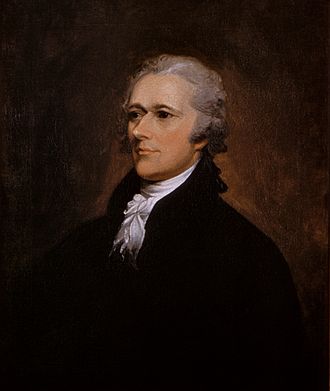 There is nothing preventing the legislatures from ratifying and proposing an amendment at the same time. As demonstrated by the CFA Compact there is nothing preventing the legislature from giving instructions to the convention to propose an amendment and simultaneously ratifying that proposal. This is why the Founders wisely did not allow for state legislatures to have the power to both propose and ratify amendments. As observed by Alexander Hamilton at the 1787 convention, "State Legislatures
will not apply for alterations [of the Constitution] but with a view to
increase their own powers." The COS/CFA
laws exclude the American people from any participation in the amendment process.
Therefore the people have no ability to prevent simultaneous proposal/ratification from occurring. This not true if the
convention is elected as the people control the proposal process
leaving the state legislatures to decide whether they will go along or
not with that proposal. Thus
two politically separate groups decide on an amendment proposal; under
COS/CFA a single political group, the state legislatures, (or a small
subsection of them) decide the question of an amendment proposal.
There is nothing preventing the legislatures from ratifying and proposing an amendment at the same time. As demonstrated by the CFA Compact there is nothing preventing the legislature from giving instructions to the convention to propose an amendment and simultaneously ratifying that proposal. This is why the Founders wisely did not allow for state legislatures to have the power to both propose and ratify amendments. As observed by Alexander Hamilton at the 1787 convention, "State Legislatures
will not apply for alterations [of the Constitution] but with a view to
increase their own powers." The COS/CFA
laws exclude the American people from any participation in the amendment process.
Therefore the people have no ability to prevent simultaneous proposal/ratification from occurring. This not true if the
convention is elected as the people control the proposal process
leaving the state legislatures to decide whether they will go along or
not with that proposal. Thus
two politically separate groups decide on an amendment proposal; under
COS/CFA a single political group, the state legislatures, (or a small
subsection of them) decide the question of an amendment proposal.
- The passage of these state laws to prevent a "runaway convention" is a political ruse. These laws are not intended to prevent a "runaway" convention but
in fact promote it in order to advance the political agenda of
COS/CFA by removing the one obstacle to that agenda--the American public. There is nothing in these laws preventing a
"runaway" state legislature controlled by COS/CFA. Further, Congress officially dealt with the question of a "runaway" convention in 1787
and officially determined there never was a "runaway" convention, that
is, the convention operated within and according to the instructions
given it by Congress on Feburary 21, 1787.
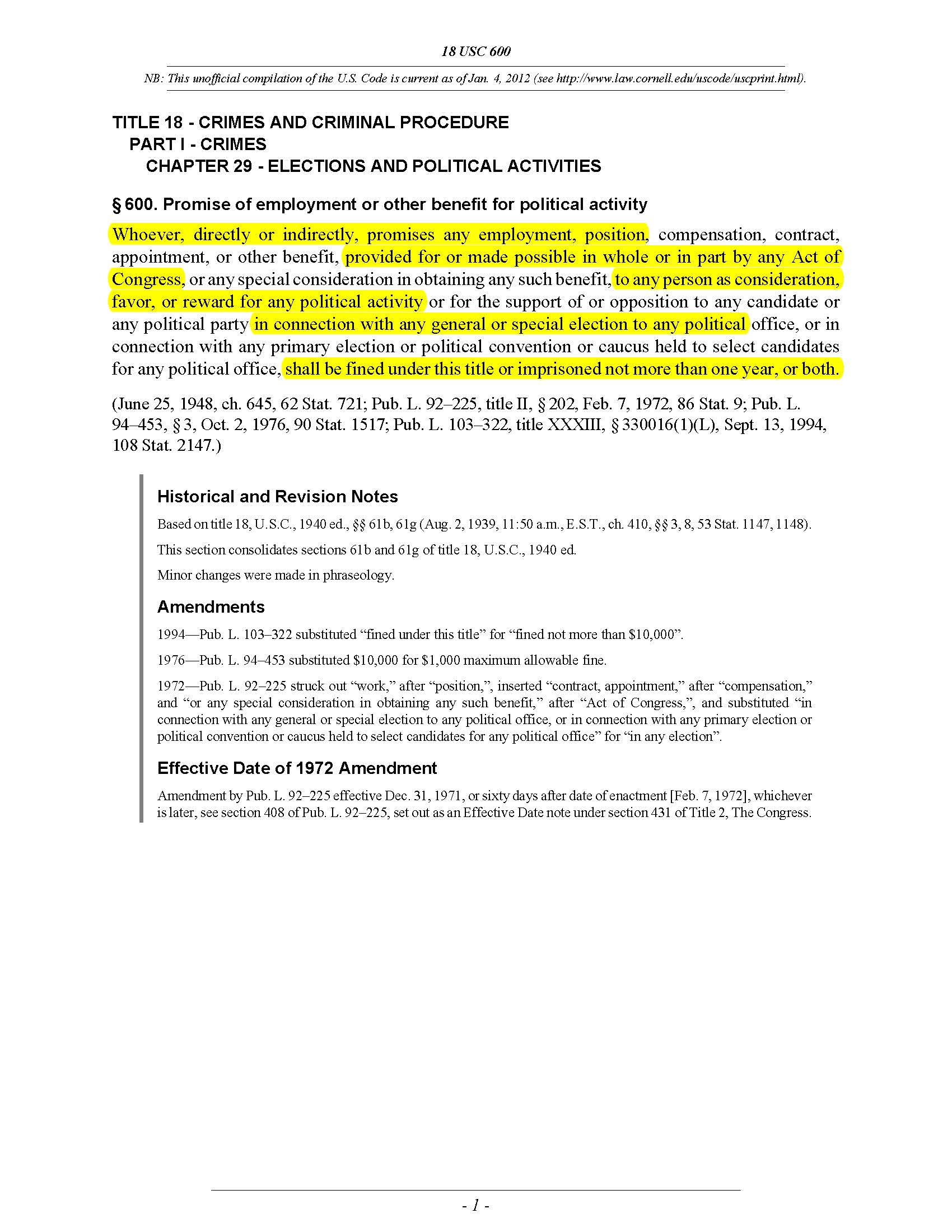 Appointment
by the state legislature of convention delegates rather than election
by the people (whose election is specifically stated in the law and
thus subject to the law) is forbidden by federal law. Federal law makes
it a crime to "directly or
indirectly, promise any employment [or] position ...provided or or made
possible in whole or in part by an Act of Congress...to any person as
consideration, favor or reward for any political activity." (Click
image left to enlarge).
Appointment
by the state legislature of convention delegates rather than election
by the people (whose election is specifically stated in the law and
thus subject to the law) is forbidden by federal law. Federal law makes
it a crime to "directly or
indirectly, promise any employment [or] position ...provided or or made
possible in whole or in part by an Act of Congress...to any person as
consideration, favor or reward for any political activity." (Click
image left to enlarge).
Obviously, the law is intended to ensure that persons who are
"appointed" by the various members of the state legislatures will obey
the "instructions" or are close political allies of the politician
making the appointment. Politics is all about scratching--"you scratch
my back, I'll scratch yours," goes the old saying. It means you do me a
political favor, I'll do you one. How would a politician choose someone
who he is relatively sure will obey his "instructions" and vote the way
he instructs? By knowing that person has done him political favors in
the past (or heavily contributed to his political campaign) and, as a
reward, appoint him to the position of delegate or commissioner to the
convention. Federal law prohibits this from occurring where an act of
Congress is involved. Article V of the Constitution mandates
Congress call the convention. Such action is clearly "an Act of
Congress." State laws calling for a convention "called by the states" are clearly unconstitutional.
- State laws which
coerce a convention delegate to vote in favor of a pre-determined
political agenda violate federal criminal law. Federal law makes it a crime to
"directly or indirectly, knowingly cause any person to make a
contribution of a thing of value (including services) [such as serving
as an appointed delegate to a COS convention] for the benefit of any
candidate or any political party by means of denial or deprivation
of... any employment, position, or work in or for...a State...if such
employment, position, work, compensation, payment, or benefit is
provided for or made possible in whole or in part by an Act of
Congress..." State laws which threaten felony arrest for failure to follow
"instructions" as well as provisions which call for the removal of the
delegate from his position of state government clearly violate this federal law.
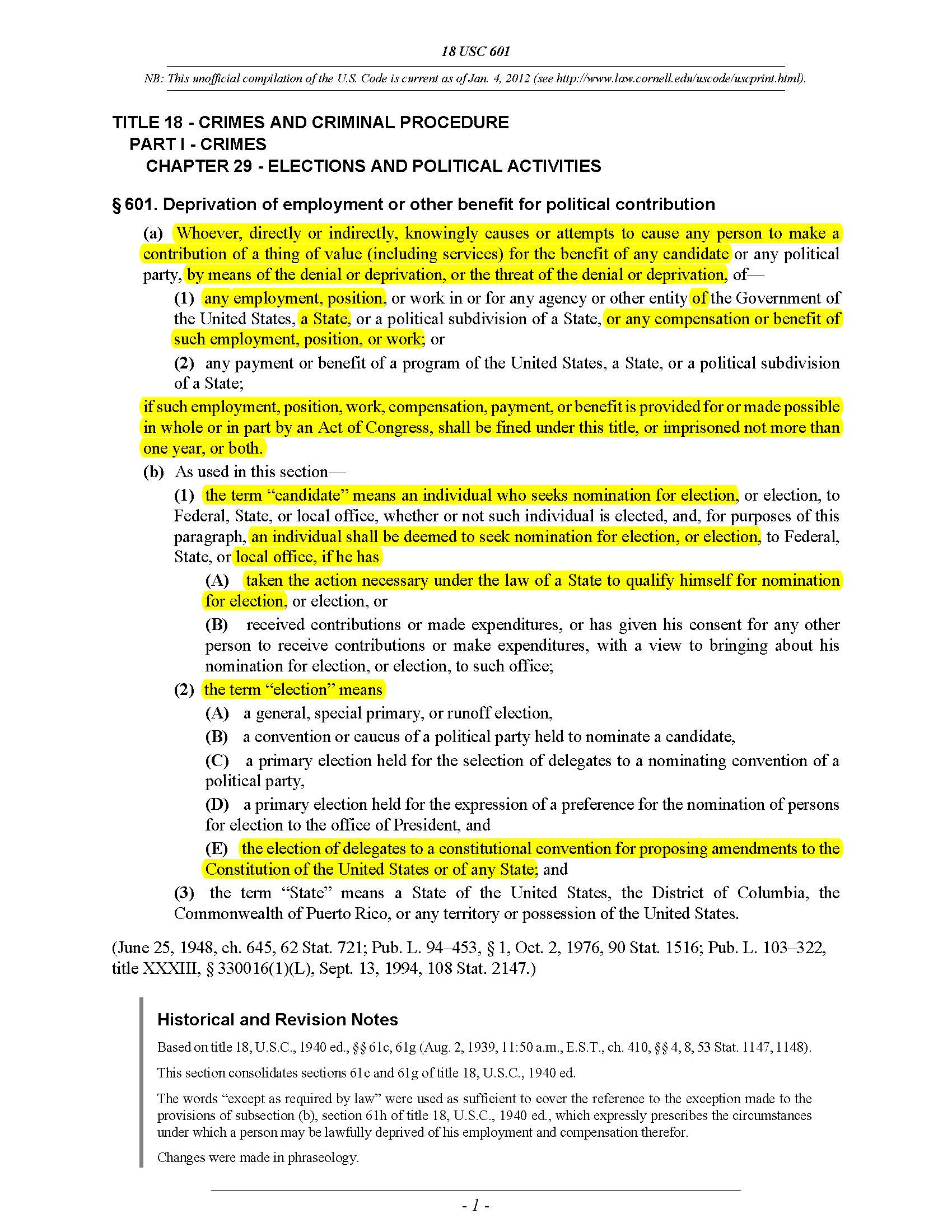 Federal
criminal further provides the term "election" includes "the
election of delegates to a constitutional convention for proposing
amendments to the Constitution of the United States..." (Click image
right to enlarge). COS/CFA might argue the state laws which do not permit election by the people and thus are in direct violation of federal law do not apply as the "commissioners" are "elected" by the state legislatures. This is incorrect.
Federal
criminal further provides the term "election" includes "the
election of delegates to a constitutional convention for proposing
amendments to the Constitution of the United States..." (Click image
right to enlarge). COS/CFA might argue the state laws which do not permit election by the people and thus are in direct violation of federal law do not apply as the "commissioners" are "elected" by the state legislatures. This is incorrect.
Federal law defines the word "election" by the use of several examples
of "elections." These include a "general", "special primary" and
"runoff election." The law also describes a "primary election" of
delegates to a political convention. All these examples of election
described by law share a common trait: all are
elections directly involving the American public who directly elects
the candidate in question. None of the examples cited involve
"election" by state legislators. Further the purpose of an election is to obtain consent from the people directly
authorizing a candidate to hold and exercise the powers of a particular
office. Without that consent any person occupying that office or
attempting to exercise the powers of that office acts illegally as he
is not qualified under federal law to hold that office.
As with all other offices and events described in the law, federal law does not make
an exception or qualification for the "election" of delegates to a
"convention for proposing amendments." The word "election"
automatically excludes the appointment by the state legislature and requires direct
election by the people of candidates for the office of delegate to a
convention for proposing amendments (an Article V Convention).
Therefore appointment by state legislature to that office violates
federal
criminal law. The word "election" as described by the examples of
election used in federal law clearly refers to the public event
routinely associated with the word "election." That word was equally,
and deliberately was intended to, apply to the election of Article V
Convention delegates.
Further, federal law describes
the term "candidate" for office as a person having "taken the action
necessary under the law of a State to qualify himself for election..."
All the state laws shown below establish certain minimum standards a
person must
meet in order to be selected by the state legislature (but not the
American people) to the office of
delegate or commissioner to a Convention of States or Compact for
America convention. The person "appointed" to the COS/CFA office may
have taken the
actions necessary under state law to qualify himself for the
appointment but under federal law is not legally qualified to assume
office because federal law mandates the candidate must be "elected" by
the people not appointed by the state legislature.
Since the "appointed" candidates from the various states are illegal
under federal law and as the courts have ruled states operate under
federal law when involved in the amendatory process, this means any
"commissioner" appointed by the state legislature who has not been
elected by the people cannot legally exercise the authority granted the
convention in the Constitution meaning the COS/CFA convention the state
laws contemplate is illegal under federal law. Therefore that
convention cannot legally propose amendments to the United States
Constitution as the people have not consented through election to
authorize those delegates to have that authority as described by
federal law.
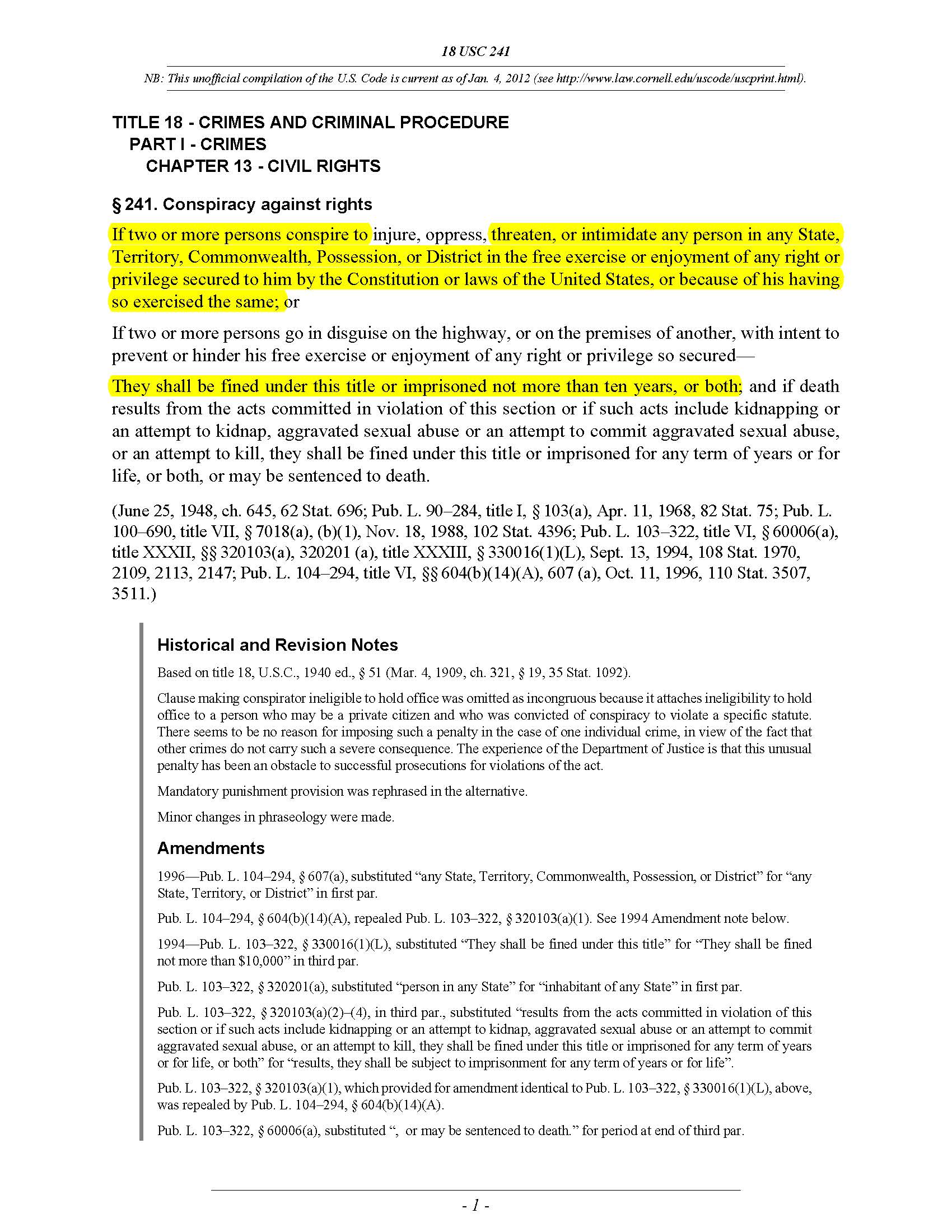
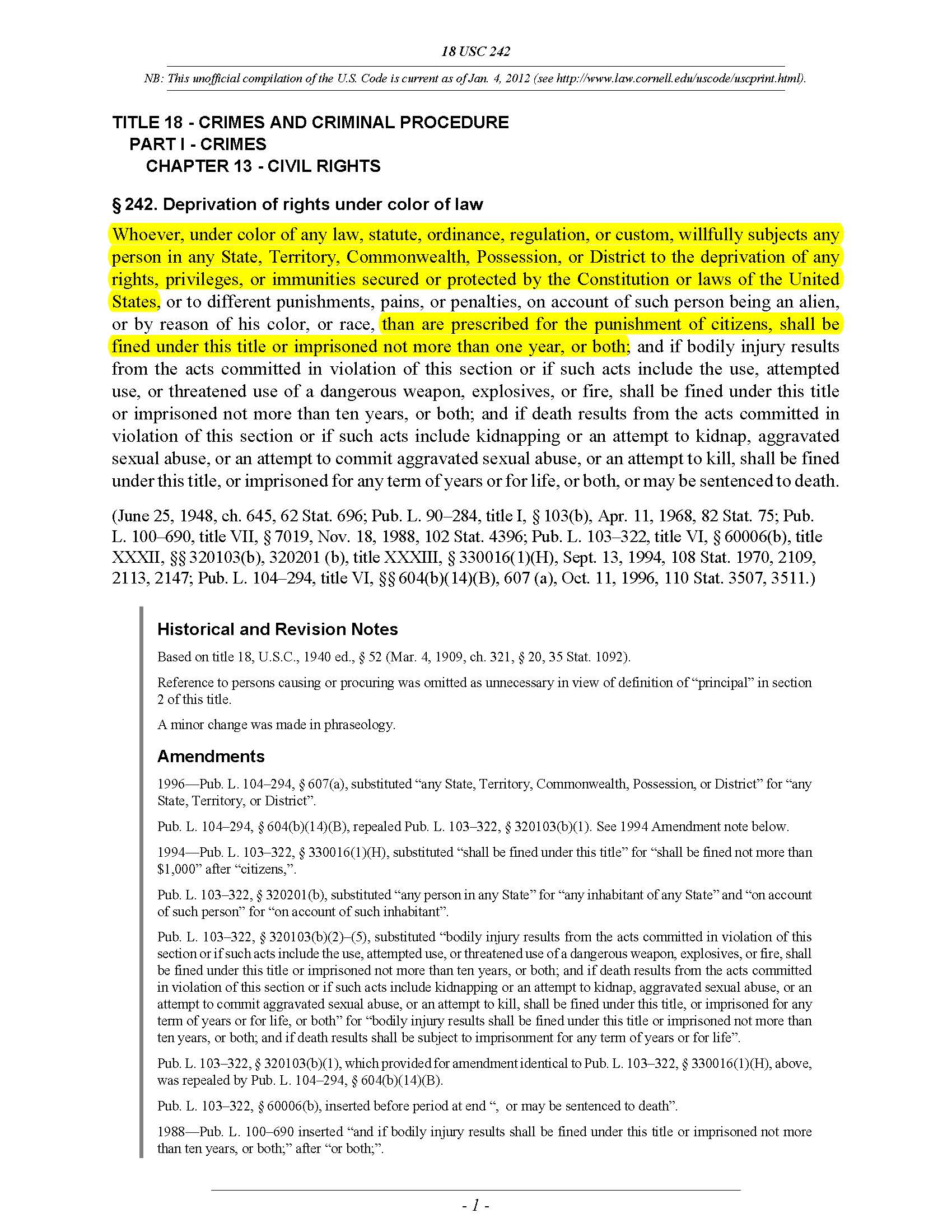 The
removal of the right to vote when otherwise guaranteed by historic
intention of the Federal Convention of 1787, the Supreme Court and
federal law raises another issue--deprivation of civil rights. This
includes not only the removal of the right to vote from the American
people but also the threat of felony prosecution against convention
"commissioners" (or whatever term is used in the various state laws to
describing convention delegates controlled by the state legislatures)
for exercising their right of
vote at the convention.
The
removal of the right to vote when otherwise guaranteed by historic
intention of the Federal Convention of 1787, the Supreme Court and
federal law raises another issue--deprivation of civil rights. This
includes not only the removal of the right to vote from the American
people but also the threat of felony prosecution against convention
"commissioners" (or whatever term is used in the various state laws to
describing convention delegates controlled by the state legislatures)
for exercising their right of
vote at the convention.
Federal law (click images left to enlarge) make
it illegal to "threaten or intimate any person ... in the free exercise
or enjoyment of any right or privilege secured to him by the
Constitution or laws of the United States, or because of his having so
exercised the same." Further federal law makes it illegal "under color
of any law" to willfully subject any person to "deprivation of any
rights, privileges or immunities secured or protected by the
Constitution or the laws of the United States...to different punishments...than are prescribed for
the punishment of citizens."
There is no law in the United States or
in any state which "punishes" a citizen for voting in an election
(except for these state laws) by depriving them of the right to vote in
that election which is guaranteed by federal law. There is no law which
"punishes" an officeholder in any office for voting as he thinks best
(except in these state laws) by depriving that officeholder of his
right of vote and arresting him for exercising a right guaranteed
by provisions in the Constitution. As
federal laws create the right
to vote on convention delegates state laws which prohibit or
prevent the "free exercise or enjoyment" of that right conflict with
federal civil rights law.
Clicking on the icon will bring up a page showing the
material obtained from the official records of the state legislature.
In the matter of Convention of States laws and applications FOAVC has
elected to present all applications or laws (recognized or not by
Convention of States) in which the application or law refers to a
"convention of states." In some instances FOAVC will reference material
within the official
documents it believes may be of interest to the reader. The files
presented are updated as new information is received.
COS
Alabama
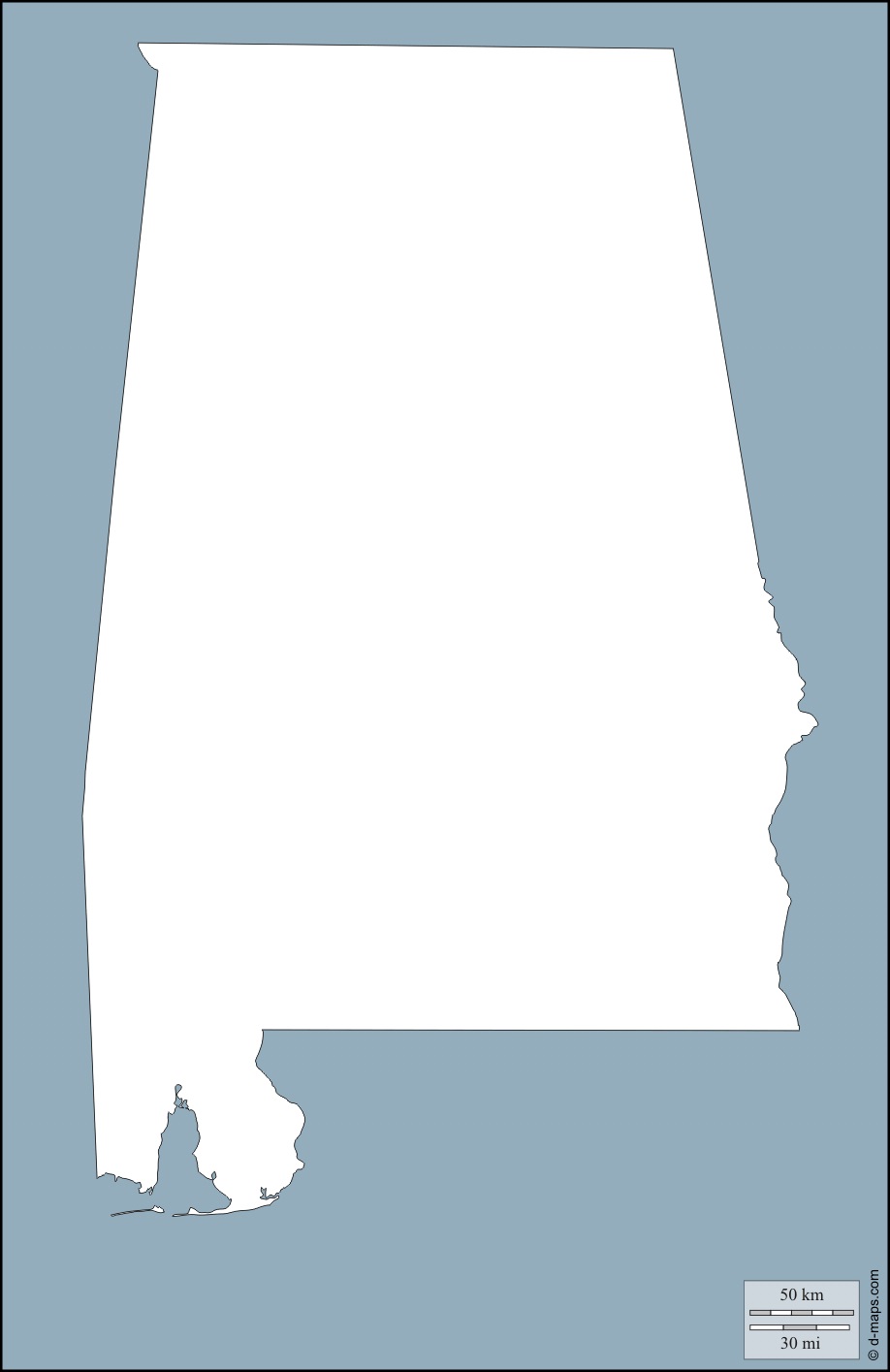
The state of Alabama enacted HJR 112 on May 22, 2015 as it COS
application. The resolution requires state laws regulating convention
delegates. HJR 112 requests the political agenda expressed by COS as
described elsewhere in this website.

Despite the requirements of HJR 112, FOAVC has
been unable to locate any Alabama state law dealing with the regulation
of convention delegates.
Alaska

The state of Alaska enacted a "Countermand" application under HCR14 as
its "convention of states" application which was permanent enrolled as
Legislative Resolution 49 on September 15, 2016. Despite claims by COS that Alaska passed a "convention of states" application
Resolution 46 only addresses a "Countermand" or nullification
amendment. It does use the term "convention of states" but only in its
opening remarks. FOAVC has been unable to locate any state record
showing the Alaska state legislature has, in fact, passed a "convention
of states" application supporting the COS political agenda.

The state of Alaska enacted Legislative Resolution 46 which was
permanently enrolled on September 23, 2016. The resolution deals with
the regulation of convention delegates from the state of Alaska to a
convention for proposing amendments. The delegates are "representatives
of the legislature" and therefore not considered "free agents" and only
are "authorized" to complete the terms specified in Resolution 46.
Delegates are strictly limited only to support a "Countermand" or
nullification amendment meaning they are not authorized to support
neither the COS or CFA agenda.
Arkansas
 On
February 18, 2019, the legislature of the state of Arkansas enacted SJR
3, an application applying for a convention of states. The application
lists the agenda of Convention of States and expresses that power to
name convention delegates "remains exclusively within the authority of
the legislatures of the several states." The application further
provides, "The General Assembly may provide further instructions to its
delegates and may recall its delegates at any time for a breach of a
duty or a violation of the instructions provided; and delegates are
bound to the instructions provided by the General Assembly and a
failure to follow the instructions provided constitutes a breach of the
delegate's duty and subjects them to recall and replacement."
On
February 18, 2019, the legislature of the state of Arkansas enacted SJR
3, an application applying for a convention of states. The application
lists the agenda of Convention of States and expresses that power to
name convention delegates "remains exclusively within the authority of
the legislatures of the several states." The application further
provides, "The General Assembly may provide further instructions to its
delegates and may recall its delegates at any time for a breach of a
duty or a violation of the instructions provided; and delegates are
bound to the instructions provided by the General Assembly and a
failure to follow the instructions provided constitutes a breach of the
delegate's duty and subjects them to recall and replacement."
Arizona

On March 15, 2017 the state of Arizona enacted HCR 2010 applying for a
convention of states. The application matches the political agenda of
Convention of States.

As of the date of this page the state of Arizona has not enacted legislation regulating convention delegates.
Florida

The state of Florida enacted SM 476, an application for a convention for proposing amendments on May 9, 2014. According to a COS news release
COS claims this application as COS application. However while the
application does support the political agenda of COS, it contains no
language referring to a "convention of states" but instead refers to
an "Article V Convention."

The state of Florida enacted CS/HB 609 on July 1, 2014
enrolled in Florida Code as Title 50, Section 38. The law establishes
the regulation of convention delegates and provides for criminal felony
prosecution (page 9) (felony in the third degree) of up to five years in prison or a fine up to $5,000
for failure of any convention delegate to follow instructions of the
state legislature. The law calls for delegate selection by the
legislature.
Georgia

The state of Georgia enacted SR 736 as its COS application on April 22,
2014. The application matches the political agenda of COS.

The state of Georgia amended Georgia State Code, Title 50, adding
Section 38 dealing with a Compact for a Balanced Budget on April 12,
2014. The compact requires delegate selection by the state legislature only. The state legislature also enacted GA Code 28-6-8 regulating the appointment of delegates. The law applies several qualifications specified under GA Code 45-2-1 to be a convention delegate. The law applies felony charges of one to five years under GA Code 16-10-1 if the delegate fails to obey "legislative instructions."
Indiana

The state of Indiana enacted SJR 14 as its COS application on March 17,
2016. The application matches the political agenda of COS.

The state of Indiana enacted two bills, SB 224 and SB 225 on May 7,
2013. The two bills combined to add a new section to the Indiana Code
IC 2-8 and IC 2-8.2. IC 2-8 deals with the selection of convention
delegates by the state legislature, criminal felony prosecution (page
3) (a Class D felony of up to three years in prison and a possible fine not to exceed $10,000)
and the creation of an "Advisory" committee made up state officials to
"advise" delegates as to whether a contemplated vote violates state
law.

The state of Indiana's second bill, SB 225 created IC 2-8.2 in Indiana
Code. IC 2-8.2 defines the qualifications for delegate, their oath
office and other associated duties.
Louisiana

The state of Louisiana enacted as its COS application, SCR 52 on June 7, 2016. The application matches the agenda of COS.

The state of Louisiana
enacted HCR 4 on May 24, 2018 regarding appointment of commissioners to
a convention of states. The law establishes the five commissioners
shall be appointed by the state legislature and subject to its control
and direction. The law does not allow for citizen participation in
delegate selection or input as to convention agenda.
Michigan

The Michigan State
Legislature enacted its COS application, SJR V, on
March 31, 2014. The term "convention of states" is mentioned in the
application but does not match the political agenda of Convention of
States. The application instead only deals with a balanced budget
amendment. The political organization Convention of States does not
count this application in its total of "convention of states"
applications.

FOAVC has been unable to locate any Michigan state law dealing with convention delegates.
Mississippi

On March 28, 2019, the
legislature of the State of Mississippi enacted CR 596 applying for a
convention of states. The application did not rescind or address
Mississippi's previous CFA application/compact of 2015. It is therefore
unclear whether the application is valid as the compact has an
exclusive clause within it. The application states it joins other COS
applications from other states and limits delegates to voting only on
those issues described in the application. The application describes
the authories of Congress according to the state legislature, in
regards to an Article V Convention. The application provides the state
legislature "may provide further instructions to its delegates" and
recall them at any time for "breach of duty or a violation of
instructions provided."

FOAVC has been able to
locate any legislation passed by the Mississippi State Legislature
regulating convention delegates other than the non-binding resolution
of March 28, 2019.
Missouri

On May 12, 2017 the
General Assembly of Missouri enacted SCR 4, an application calling for a
convention of states. The application described certain
"understandings": (1) Congress limited to the ministerial function of
calling a convention; (2) the call may only occur when applications of
the same subject from two thirds of the state legislatures occur; (3)
Congress has no power to regulate delegates; (4) the General Assembly
"may recall its delegates at any time for breach of their duties or
violations of their instructions."

FOAVC has been able to locate any Missouri state law dealing with convention delegates.
North Dakota

On March 27, 2017 the North Dakota State Legislature enacted HCR 3006
applying for a "convention of states." The application matches the
political agenda of Convention of States.

In March, 2017, the
North Dakota State Legislature amended Chapter 54 of North Dakota Law
to include "Certification of delegates to United States convention of
the states."
Oklahoma
 The state of Oklahoma enacted SJR 4 as its COS application on April 27, 2016. The application is unique in that combines two
applications in the same measure. The first, found in sections 2
through 5 is a general balanced budget amendment and specifies (page 3)
that the application is to be aggregated with 28 other state
applications. The second, found in sections 6 through 9 calls for a COS
convention following the political agenda of COS and the application is
to be aggregated with the application of six other COS states.
The state of Oklahoma enacted SJR 4 as its COS application on April 27, 2016. The application is unique in that combines two
applications in the same measure. The first, found in sections 2
through 5 is a general balanced budget amendment and specifies (page 3)
that the application is to be aggregated with 28 other state
applications. The second, found in sections 6 through 9 calls for a COS
convention following the political agenda of COS and the application is
to be aggregated with the application of six other COS states.

In April, 2018, the state of Oklahoma enacted HJR 1048 regulating convention delegates.
South Carolina
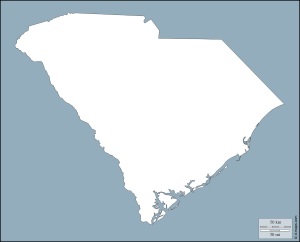

On December 13, 1832, the state of South Carolina
was the first state to submit an application for a "convention of
states" convention. The political organization Convention of States
does not recognize this application as a "convention of states"
application despite the fact the phrase "convention of states" was
first used in this application.

FOAVC has been unable to locate any South Carolina law dealing with convention delegates.
Tennessee

The state of Tennessee enacted as its COS application SJR 67 on
February 9, 2016. The application follows the political agenda of COS.
 The
state of Tennessee enacted HB 1379 on May 22, 2014 regulating selection
by the state legislature of delegates to an Article V Convention. The
law provides for a Class E felony for any delegate failing to follow
"instructions" of the state legislature. A Class E felony is punishable
by one to six years in prison as well as a fine up to $3,000.
The
state of Tennessee enacted HB 1379 on May 22, 2014 regulating selection
by the state legislature of delegates to an Article V Convention. The
law provides for a Class E felony for any delegate failing to follow
"instructions" of the state legislature. A Class E felony is punishable
by one to six years in prison as well as a fine up to $3,000.
Texas

On May 5, 2017 the
Texas State Legislature enacted SJR 2 applying for an Article V
Convention call. While the application reflects the political agenda of
the political organization "Convention of States" nowhere in the
application is the phrase "convention of states" used. Nevertheless the
political organization "Convention of States" has claimed the
application as being a "convention of states" application.

On June 6, 2017, the
Texas State Legislature enacted SB 21 for the purpose of regulating
convention delegates. The law calls for appointment of all
delegates by the state legislature, recall of delegates who fail to
follow legislative instructions, and provides for a "state jail felony"
for delegates failing to following such instructions.
Utah

On Feburary 8, 2019, the legislature of the state of Utah enacted
SJR009 calling for a convention of states. calling for fiscal
restraints on the federal government, limits on power and jurisdiction
of the federal government and term limits for federal officers.

On May 13, 2015, the legislature of the state of Utah enacted
legislation regulating Article V Convention delegates. As the law calls
for felony arrest of any delegate disobeying these "instructions" FOAVC
classifies the law as a COS law rather than a general Article V
Convention law.
Wyoming

On March 3, 2017 the
legislature of the state of Wyoming enacted HJR0002 calling for a
"convention of states" for the limited purpose of considering a
balanced budget. As with other state applications which do not reflect
the political agenda of "Convention of States", the political
organization Convention of States has not counted the application as
one of its "convention of states" applications.

In
March, 2017, the legislature of the state of Wyoming enacted Chapter
22, "Limitations of authority for delegates to an article V convention"
calling for felony arrest of any delegate failing to follow
"instructions" regarding an Article V Convention. As the law calls for felony arrest of any delegate
disobeying these "instructions" FOAVC classifies the law as a COS law
rather than a general Article V Convention law.
CFA
Alaska

The "Compact for a Balanced Budget" regulates the convention, delegates
and
ratification and therefore requires no other legislative act by the
state. The state of Alaska enacted the CFA compact as HB 284 on July
21, 2014.
Arizona

The "Compact for a Balanced Budget" regulates the convention, delegates
and
ratification and therefore requires no other legislative act by the
state. The state of Arizona enacted the CFA compact as HCR 2002 on March 30, 2017.

However, the Arizona State Legislature apparently ignored the terms of
its own compact and on March 30, 2017 also enacted HCR 2022, "A
CONCURRENT RESOLUTION PROVIDING FOR THE SELECTION AND INSTRUCTION OF
COMMISSIONERS AND FOR A PLANNING CONVENTION REGARDING AN ARTICLE V CONVENTION FOR PROPOSING AN AMENDMENT
TO THE CONSTITUTION OF THE UNITED STATES." As the resolution concerns
"instructions" for an Article V Convention rather than a "Convention of
States" it appears the statement by FOAVC that the state of Arizona has
not enacted COS legislation remains valid.
Georgia

The state of Georgia
enacted the CFA compact as HB 794 which regulates convention,
delegates, and ratification on April 12, 2014.
Mississippi

The state of Mississippi enacted the CFA compact as SB2389 which
regulates convention, delegates and ratification on March 13, 2015.
North Dakota

The state of North Dakota enacted the CFA compact as EHB 1138 which
regulates convention, delegates and ratification on April 1, 2015.
Non-COS/CFA State laws regulating Convention Delegates
South Dakota

On February 15, 2017, the legislature of the state of South Dakota
enacted regulations concerning delegates to an Article V Convention.
Wisconsin

The state of Wisconsin, has enacted non-COS/CFA
laws regulating an Article V Convention. The resolution, AJR 20, does
not mention "convention of states" nor "Compact for America" in its
text. The law requires the convention follow rules proposed by the
Assembly of State Legislatures in 2016.
Page Last Updated: 6 MARCH 2020
 There is nothing preventing the legislatures from ratifying and proposing an amendment at the same time. As demonstrated by the CFA Compact there is nothing preventing the legislature from giving instructions to the convention to propose an amendment and simultaneously ratifying that proposal. This is why the Founders wisely did not allow for state legislatures to have the power to both propose and ratify amendments. As observed by Alexander Hamilton at the 1787 convention, "State Legislatures
will not apply for alterations [of the Constitution] but with a view to
increase their own powers." The COS/CFA
laws exclude the American people from any participation in the amendment process.
Therefore the people have no ability to prevent simultaneous proposal/ratification from occurring. This not true if the
convention is elected as the people control the proposal process
leaving the state legislatures to decide whether they will go along or
not with that proposal. Thus
two politically separate groups decide on an amendment proposal; under
COS/CFA a single political group, the state legislatures, (or a small
subsection of them) decide the question of an amendment proposal.
There is nothing preventing the legislatures from ratifying and proposing an amendment at the same time. As demonstrated by the CFA Compact there is nothing preventing the legislature from giving instructions to the convention to propose an amendment and simultaneously ratifying that proposal. This is why the Founders wisely did not allow for state legislatures to have the power to both propose and ratify amendments. As observed by Alexander Hamilton at the 1787 convention, "State Legislatures
will not apply for alterations [of the Constitution] but with a view to
increase their own powers." The COS/CFA
laws exclude the American people from any participation in the amendment process.
Therefore the people have no ability to prevent simultaneous proposal/ratification from occurring. This not true if the
convention is elected as the people control the proposal process
leaving the state legislatures to decide whether they will go along or
not with that proposal. Thus
two politically separate groups decide on an amendment proposal; under
COS/CFA a single political group, the state legislatures, (or a small
subsection of them) decide the question of an amendment proposal. Appointment
by the state legislature of convention delegates rather than election
by the people (whose election is specifically stated in the law and
thus subject to the law) is forbidden by federal law. Federal law makes
it a crime to "directly or
indirectly, promise any employment [or] position ...provided or or made
possible in whole or in part by an Act of Congress...to any person as
consideration, favor or reward for any political activity." (Click
image left to enlarge).
Appointment
by the state legislature of convention delegates rather than election
by the people (whose election is specifically stated in the law and
thus subject to the law) is forbidden by federal law. Federal law makes
it a crime to "directly or
indirectly, promise any employment [or] position ...provided or or made
possible in whole or in part by an Act of Congress...to any person as
consideration, favor or reward for any political activity." (Click
image left to enlarge).  Federal
criminal further provides the term "election" includes "the
election of delegates to a constitutional convention for proposing
amendments to the Constitution of the United States..." (Click image
right to enlarge). COS/CFA might argue the state laws which do not permit election by the people and thus are in direct violation of federal law do not apply as the "commissioners" are "elected" by the state legislatures. This is incorrect.
Federal
criminal further provides the term "election" includes "the
election of delegates to a constitutional convention for proposing
amendments to the Constitution of the United States..." (Click image
right to enlarge). COS/CFA might argue the state laws which do not permit election by the people and thus are in direct violation of federal law do not apply as the "commissioners" are "elected" by the state legislatures. This is incorrect. 
 The
removal of the right to vote when otherwise guaranteed by historic
intention of the Federal Convention of 1787, the Supreme Court and
federal law raises another issue--deprivation of civil rights. This
includes not only the removal of the right to vote from the American
people but also the threat of felony prosecution against convention
"commissioners" (or whatever term is used in the various state laws to
describing convention delegates controlled by the state legislatures)
for exercising their right of
vote at the convention.
The
removal of the right to vote when otherwise guaranteed by historic
intention of the Federal Convention of 1787, the Supreme Court and
federal law raises another issue--deprivation of civil rights. This
includes not only the removal of the right to vote from the American
people but also the threat of felony prosecution against convention
"commissioners" (or whatever term is used in the various state laws to
describing convention delegates controlled by the state legislatures)
for exercising their right of
vote at the convention.




















